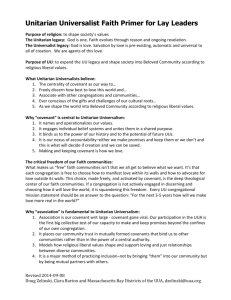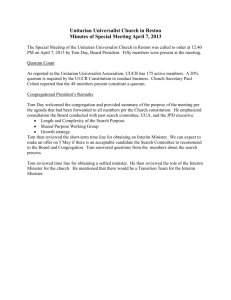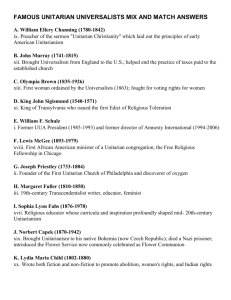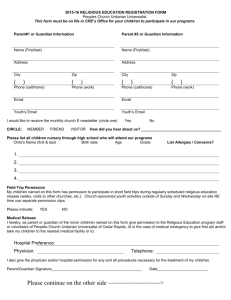Board * District Executive (DE) Linkage Policies
advertisement
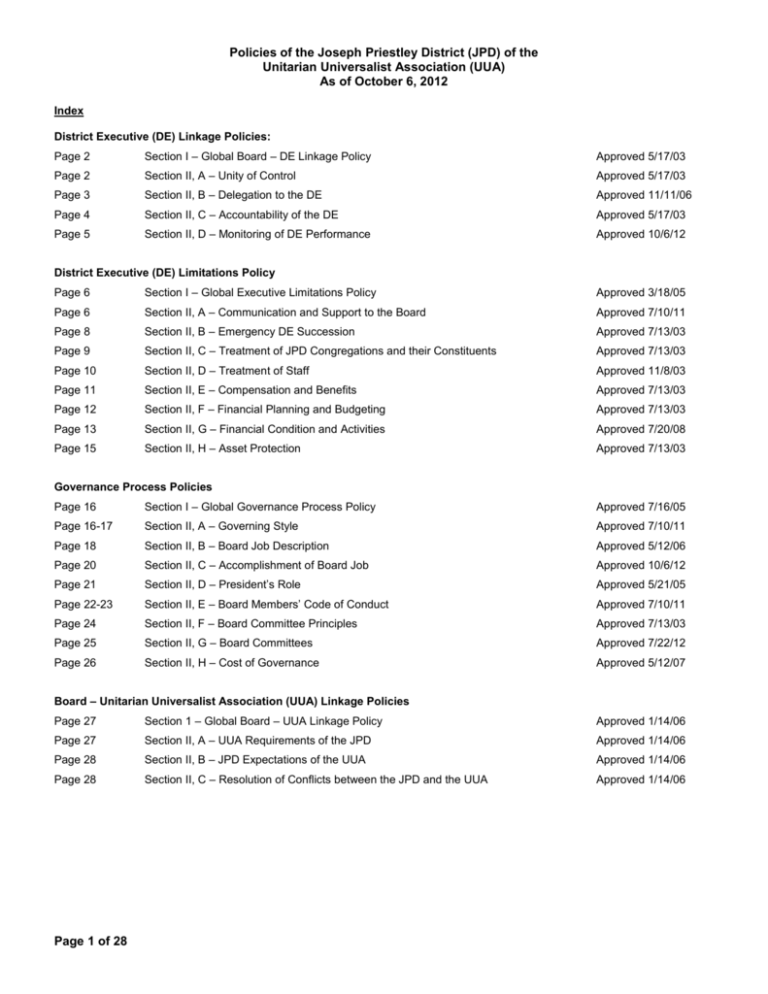
Policies of the Joseph Priestley District (JPD) of the Unitarian Universalist Association (UUA) As of October 6, 2012 Index District Executive (DE) Linkage Policies: Page 2 Section I – Global Board – DE Linkage Policy Approved 5/17/03 Page 2 Section II, A – Unity of Control Approved 5/17/03 Page 3 Section II, B – Delegation to the DE Approved 11/11/06 Page 4 Section II, C – Accountability of the DE Approved 5/17/03 Page 5 Section II, D – Monitoring of DE Performance Approved 10/6/12 District Executive (DE) Limitations Policy Page 6 Section I – Global Executive Limitations Policy Approved 3/18/05 Page 6 Section II, A – Communication and Support to the Board Approved 7/10/11 Page 8 Section II, B – Emergency DE Succession Approved 7/13/03 Page 9 Section II, C – Treatment of JPD Congregations and their Constituents Approved 7/13/03 Page 10 Section II, D – Treatment of Staff Approved 11/8/03 Page 11 Section II, E – Compensation and Benefits Approved 7/13/03 Page 12 Section II, F – Financial Planning and Budgeting Approved 7/13/03 Page 13 Section II, G – Financial Condition and Activities Approved 7/20/08 Page 15 Section II, H – Asset Protection Approved 7/13/03 Governance Process Policies Page 16 Section I – Global Governance Process Policy Approved 7/16/05 Page 16-17 Section II, A – Governing Style Approved 7/10/11 Page 18 Section II, B – Board Job Description Approved 5/12/06 Page 20 Section II, C – Accomplishment of Board Job Approved 10/6/12 Page 21 Section II, D – President’s Role Approved 5/21/05 Page 22-23 Section II, E – Board Members’ Code of Conduct Approved 7/10/11 Page 24 Section II, F – Board Committee Principles Approved 7/13/03 Page 25 Section II, G – Board Committees Approved 7/22/12 Page 26 Section II, H – Cost of Governance Approved 5/12/07 Board – Unitarian Universalist Association (UUA) Linkage Policies Page 27 Section 1 – Global Board – UUA Linkage Policy Approved 1/14/06 Page 27 Section II, A – UUA Requirements of the JPD Approved 1/14/06 Page 28 Section II, B – JPD Expectations of the UUA Approved 1/14/06 Page 28 Section II, C – Resolution of Conflicts between the JPD and the UUA Approved 1/14/06 Page 1 of 28 Policies of the Joseph Priestley District (JPD) of the Unitarian Universalist Association (UUA) As of October 6, 2012 Board – District Executive (DE) Linkage Policies I. Global Board – DE Linkage Policy The Board's only connection to the District’s operating organization will be through the DE. II. A. Unity of Control Only official decisions of the Board acting as a body are binding on the DE. Accordingly: 1. Decisions or instructions of individual Board members, officers, or committees are not binding on the DE except in rare instances when the Board has specifically authorized such exercise of authority. 2. In the case of Board members or committees requesting information or assistance without Board authorization, the DE can refuse such requests that require, in the DE's opinion, a material amount of staff time or funds, or are disruptive. Approved 5/17/03 Page 2 of 28 Policies of the Joseph Priestley District (JPD) of the Unitarian Universalist Association (UUA) As of October 6, 2012 Board – District Executive (DE) Linkage Policies, II: B. Delegation to the DE The Board will instruct the DE through written policies, allowing the DE to use any reasonable interpretation of these policies. Accordingly: 1. As long as the DE uses any reasonable interpretation of the Board's policies the DE is authorized to establish all further policies, make all decisions, take all actions, establish all practices, and develop all activities. The Board will judge both the reasonableness of the interpretation and whether data demonstrate accomplishment of the interpretation. 2. The Board may change its policies, thereby shifting the boundary between Board and DE domains. By doing so, the Board changes the latitude of choice given to the DE. But as long as any particular delegation is in place, the Board will respect and support the DE's choices. Approved 11/11/06 Page 3 of 28 Policies of the Joseph Priestley District (JPD) of the Unitarian Universalist Association (UUA) As of October 6, 2012 Board – District Executive (DE) Linkage Policies, II: C. Accountability of the DE The DE is the Board's only link to staff members, who are accountable only to and derive their authority only from the DE insofar as the Board is concerned. Accordingly: 1. The Board will never give instructions to persons who report directly or indirectly to the DE. 2. The Board will refrain from evaluating, either formally or informally, any staff other than the DE, except if asked by the UUA to participate in an evaluation of a co-employed staff member. 3. The Board will view DE performance as identical to District performance so that District accomplishment of Board-stated Ends and compliance with board-proscribed limitations will be viewed as successful DE performance. Approved 5/17/03 Page 4 of 28 Policies of the Joseph Priestley District (JPD) of the Unitarian Universalist Association (UUA) As of October 6, 2012 Board – District Executive (DE) Linkage Policies, II: D. Monitoring of DE Performance The Board will systematically, regularly, and rigorously monitor the DE's performance. The evaluation will be solely against the Ends and Executive Limitations policies. Accordingly: 1. Monitoring data can be: a) Internal: An internal report from the DE. b) External: A report from a disinterested third party that the Board selects. c) Direct: An inspection by the Board. 2. The criteria for monitoring are the DE's interpretations of the Board's policies. 3. Monitoring Schedule: All policies that instruct the DE will be monitored at a frequency and by a method chosen by the board. The board can monitor any policy at any time by any method, but will ordinarily depend on a routine schedule. Non-compliance, if applicable, shall be reported at every board meeting. Policy IIG Financial Conditions & Activities Method Internal Frequency Continuous IIA Communication & Support of Board Audit IIB-H DE Limitations DE Linkage Policies Governance Process Policies Ends Strategic Plan Internal External Internal Internal Internal Internal Internal Annual Annual Annual Annual Annual Annual Annual Board Mtg. Every regularly scheduled meeting October January January April April July July Approved 10/6/12 Page 5 of 28 Policies of the Joseph Priestley District (JPD) of the Unitarian Universalist Association (UUA) As of October 6, 2012 District Executive (DE) Limitations Policy I. Global Executive Limitations Policy The DE shall not cause or allow any practice, activity, decision, or organizational circumstance that is either unlawful, imprudent, in violation of commonly accepted business and professional ethics or applicable UUA codes of professional conduct and ethics; or inconsistent with the UUA’s principles and sources. II. A. Communication and Support to the Board The DE shall not permit the Board to be uninformed or unsupported in its work. Accordingly, the DE shall not: 1. Neglect to submit monitoring data required by the Board (see policy on Monitoring DE Performance) in a timely, accurate, and understandable fashion, directly addressing provisions of Board policies being monitored. 2. Let the Board be unaware of relevant trends, anticipated adverse media coverage, and material external and internal changes, particularly changes in the assumptions upon which any Board policy has previously been established. 3. Fail to advise the Board if, in the DE’s opinion, the Board is not in compliance with its own policies on Governance Process and Board-DE Linkage, particularly in the case of Board behavior that is detrimental to the work relationship between the Board and the DE. 4. Fail to marshal for the Board as many staff and external points of view, issues, and options as needed for fully informed Board choices. 5. Present information in unnecessarily complex or lengthy form or in a form that fails to differentiate among information of three types: monitoring, decision preparation, and other. 6. Fail to provide a mechanism for official Board, officer, or committee communications. 7. Fail to deal with the Board as a whole except when fulfilling individual requests for information or responding to officers or committees duly charged by the Board. 8. Fail to report in a timely manner an actual or anticipated non-compliance with any policy of the Board. 9. Fail to supply for the consent agenda all items delegated to the DE, yet required by law or contract to be Board-approved, along with the monitoring assurance pertaining thereto. 10. Fail to work with the Board in planning and convening the annual meeting and conference. 11. Fail to operate with a strategic plan that specifies how the ends are to be realized and outcomes to be attained for specific periods of time. This plan will be integrated with the multiyear plan specified in II.F. Financial Planning and Budgeting. 12. Fail to seek racial, ethnic, gender, sexual identity, generational and disability/ability status diversity in appointments/selection of volunteer and paid staff. Page 6 of 28 Policies of the Joseph Priestley District (JPD) of the Unitarian Universalist Association (UUA) As of October 6, 2012 13. Fail to report immediately any fiscal misconduct to the Board. Approved 7/10/11 Page 7 of 28 Policies of the Joseph Priestley District (JPD) of the Unitarian Universalist Association (UUA) As of October 6, 2012 District Executive (DE) Limitations Policy, II: B. Emergency DE Succession In order to protect the Board from sudden loss of the DE’s services, the DE shall not: 1. Fail to provide for familiarity with Board and DE issues and processes on the part of the staff sufficient to allow the staff to operate independently until the Board and UUA could provide an interim DE. 2. Fail to communicate an emergency succession plan to the Board. Approved 7/13/03 Page 8 of 28 Policies of the Joseph Priestley District (JPD) of the Unitarian Universalist Association (UUA) As of October 6, 2012 District Executive (DE) Limitations Policy, II: C. Treatment of JPD Congregations and their Constituents With respect to interactions with JPD Congregations and their constituents or those applying to be congregations or constituents, the DE shall not cause or allow conditions, procedures, or decisions that are unsafe, undignified, unnecessarily intrusive, misleading, or that fail to provide appropriate confidentiality or privacy. Accordingly, the DE shall not: 1. Fail to establish a clear understanding of what may be expected and what may not be expected from the services offered. 2. Fail to inform of this policy or to provide a grievance process to those who believe they have not been accorded a reasonable interpretation of their rights under this policy. 3. Fail to develop a policy that will protect privacy and confidentiality. 4. Fail to evaluate programs annually and modify or terminate them as needed. Approved 7/26/09 Page 9 of 28 Policies of the Joseph Priestley District (JPD) of the Unitarian Universalist Association (UUA) As of October 6, 2012 District Executive (DE) Limitations Policy, II: D. Treatment of Staff With respect to the hiring and treatment of paid and volunteer staff, the DE may not cause or allow conditions that are unfair, undignified, disorganized, or unclear. Therefore, the DE shall not: 1. Operate without written personnel policies that: in accordance with Delaware law do not create a contractual relationship but provide regular performance reviews, clarify hiring practices and personnel rules for staff, provide for effective handling of grievances, and protect against wrongful conditions such as nepotism and grossly preferential treatment for personal reasons. 2. Discriminate against any staff member for expressing an ethical dissent. 3. Prevent staff from bringing grievances to the Board when: a) Internal procedures have been exhausted, or b) The employee alleges either that (1) Board policy has been violated to his or her detriment or (2) Board policy does not adequately protect his or her human rights. 4. Fail to acquaint staff with their rights under this policy. 5. Fail to acquaint staff of their obligation to report immediately to the Board fiscal misconduct by the District Executive. 6. Fail to require paid staff to have and carry out self-care and professional development plans. Approved 11/8/03 Page 10 of 28 Policies of the Joseph Priestley District (JPD) of the Unitarian Universalist Association (UUA) As of October 6, 2012 District Executive (DE) Limitations Policy, II: E. Compensation and Benefits With respect to employment, compensation, and benefits to employees, consultants, contract workers, and volunteers, the DE shall not cause or allow jeopardy to fiscal integrity or public image. Therefore, the DE shall not: 1. Change his or her own compensation or benefits. 2. Promise or imply permanent or guaranteed employment. 3. Establish current compensation and benefits that deviate materially from the geographic or professional market for the skills employed, including UUA compensation guidelines. 4. Create compensation obligations over a longer term than revenues can be safely projected, in no event longer than one year and in all events subject to losses in revenue. 5. Establish or change pension benefits so as to cause unpredictable or inequitable situations, including by: a) Incurring unfunded liabilities. b) Providing less than a basic level of benefits to all full-time employees. c) Allowing any employee to lose benefits already accrued under any foregoing plan. d) Treating the DE differently from other key employees. Approved 7/13/03 Page 11 of 28 Policies of the Joseph Priestley District (JPD) of the Unitarian Universalist Association (UUA) As of October 6, 2012 District Executive (DE) Limitations Policy, II: F. Financial Planning and Budgeting Financial planning for any fiscal year or the remaining part of any fiscal year shall not deviate materially from the Board’s Ends priorities, risk fiscal jeopardy, or fail to be derived from a multiyear plan. Therefore, the DE shall not allow budgeting that: 1. Contains too little information to enable credible projection of revenues and expenses, cash flow, and disclosure of planning assumptions. 2. Plans the expenditure in any fiscal year of more funds than are conservatively projected to be available in that period. 3. Provides less for Board prerogatives during the year than is set forth in the Cost of Governance policy. Approved 7/13/03 Page 12 of 28 Policies of the Joseph Priestley District (JPD) of the Unitarian Universalist Association (UUA) As of October 6, 2012 District Executive (DE) Limitations Policy, II: G. Financial Condition and Activities With respect to the actual, ongoing financial conditions and activities, the DE shall not cause or allow the development of fiscal jeopardy or a material deviation of actual expenditures from Board priorities established in the Ends policies. Therefore, the DE shall not: 1. Expend more funds in any given fiscal year than have been budgeted unless approved by the board. 2. Indebt the organization beyond amounts repayable within the fiscal year from budgeted funds. 3. Use restricted reserves for purposes unrelated to those for which they are designated. 4. Fail to settle payroll, payroll or other applicable taxes, and debts in a timely manner. 5. Fail to secure tax exemptions whenever and wherever practicable. 6. Make a single purchase or commitment of greater than $5000 without consulting the Board (excluding Chalice Lighter grants). 7. Acquire, encumber or dispose of real property 8. Fail to pursue receivables aggressively, apart from APF dues, after a reasonable grace period. 9. Fail to maintain adequate records or pursue appropriate payments of full fair share district dues or APF. 10. Reduce or allow unrestricted cash to drop below a safety reserve of 10% of projected annual expenditures, or 5% in the case of an emergency with board notifications. 11. Permit more bank accounts to be used than are strictly necessary for efficient operation and control. 12. Allow any bank accounts to be kept without proper accounting for all funds, including an annual external audit. 13. Allow any grant making body within the JPD to function without adequate policies, and procedures, and accounting controls in place to ensure fairness, effectiveness, and fiscal responsibility in their process. 14. Allow funds to be raised in the District’s name or to support District activities without proper oversight of: a) The procedures used to raise the funds. b) The timing of the fundraising activity with consideration of conflicts with other fundraising activity, including but not limited to the District and UUA Fair Share campaigns and other special funding requests. Page 13 of 28 Policies of the Joseph Priestley District (JPD) of the Unitarian Universalist Association (UUA) As of October 6, 2012 c) The accounting of funds raised to ensure that monies are properly included in the overall JPD accounts, whether they are earmarked for a special purpose or not. Approved 7/20/08 Page 14 of 28 Policies of the Joseph Priestley District (JPD) of the Unitarian Universalist Association (UUA) As of October 6, 2012 District Executive (DE) Limitations Policy, II: H. Asset Protection The DE shall not allow the assets to be unprotected, inadequately maintained, or unnecessarily risked. Therefore the DE shall not: 1. Fail to insure against theft and casualty losses to at least 80 percent of replacement value and against liability losses to Board members, staff, and the organization itself in an amount greater than the average for comparable organizations. 2. Allow unbonded personnel access to material amounts of funds. 3. Subject plant and equipment to improper wear and tear or insufficient maintenance. 4. Unnecessarily expose the organization, its Board, or its staff to claims of liability. 5. Make any purchase: a) Wherein normally prudent protection has not been given against conflict of interest. b) Of over $1000 without having obtained comparative prices and quality. c) Of over $1000 without a stringent method of assuring the balance of longterm quality and cost. 6. Fail to protect intellectual property, information, and files from loss of significant damage. 7. Receive, process, or disburse funds under controls that are insufficient to meet generally accepted accounting principles (GAAP). 8. Invest or hold operating capital in insecure instruments, including uninsured checking accounts and bonds of less than AA rating, or in non-interest bearing accounts except when necessary to facilitate ease in operational transactions. 9. Endanger the organization’s public image or credibility, particularly in ways that would hinder its accomplishment of mission. Approved 7/13/03 Page 15 of 28 Policies of the Joseph Priestley District (JPD) of the Unitarian Universalist Association (UUA) As of October 6, 2012 Governance Process Policies I. Global Governance Process Policy The purpose of the Board, on behalf of the congregations of the Joseph Priestley District, is to see to it that the JPD of the Unitarian Universalist Association achieves what it intends to and avoids unacceptable actions and situations. II. Governance Process Policies A. Governing Style The Board will govern with an emphasis on outward vision rather than internal preoccupation, encouragement of diversity in viewpoints, strategic leadership more than on administrative detail, a clear distinction of Board and District Executive roles, collective rather than individual decisions, future rather than on past or present, proactivity rather than reactivity, and viewing all actions with an anti-racist and anti-oppressive lens. Therefore, the Board will: 1. Cultivate a sense of group responsibility. The Board, not the staff, will be responsible for excellence in governing. The Board will be the initiator of policy, not merely a reactor to staff initiatives. The Board will use the expertise of individual members to enhance the ability of the Board as a body rather than to substitute individual judgments for the Board’s values. The Board will allow no officer, individual, or committee of the Board to hinder or be an excuse for not fulfilling Board commitments. 2. Direct, control, and inspire the organization through the careful establishment of broad written policies reflecting the Board’s values and perspectives about ends to be achieved and means to be avoided. The Board’s major policy focus will be on the intended long-term effects, not on the administrative or programmatic means of attaining those effects. 3. Model its anti-racist and anti-oppressive aspirations by working with the Nominating Committee, other Committees, the District Executive and other district entities to ensure racial, ethnic, gender, sexual identity, generational and disability/ability status diversity in selection of Board members, committee members, volunteers and other leaders in the district. 4. Enforce upon itself whatever discipline is needed to govern with excellence. Discipline will apply to matters such as attendance, preparation, policy-making principles, respect of roles, submission of expense vouchers, ensuring continuance of governance capability, and adherence to the agreed upon Code of Conduct (see Governance Process Policy II.E and sub-policies). If at any time any words or actions of any Board member cause concern to any other Board member, that concern regarding possible violation of the Code of Conduct will be addressed in the following steps: a) A member whose behavior seems inconsistent with the standards in the Code of Conduct should first be cautioned by a colleague through friendly remonstrance. b) If the colleague feels uncomfortable or uncertain about speaking to the member, the President or other trusted member can be called in for assistance in communicating personally. c) If this action fails, a grievance or complaint may be made in writing to the President of the Board, who will then provide a copy of the complaint or grievance to the person against whom it is directed. (In all cases, the first action Page 16 of 28 Policies of the Joseph Priestley District (JPD) of the Unitarian Universalist Association (UUA) As of October 6, 2012 Governance Process Policies, II, A, 3 (cont.): in response shall be to approach those involved in a pastoral manner, seeking a fair and sound collegial resolution. If it is determined that additional fact-finding is needed, the President or other designated member of the Board may have to question the person, or persons, involved, or seek documentation, always within the limits of confidentiality.) d) Board members shall have full access and full freedom and right to respond to all complaints and evidence cited against them. e) The Board must decide on action in response to a complaint or grievance, and give such decision in writing, in the form of one the following actions: (1) Advice that the complaint or grievance is unfounded. (2) Caution, admonition or reprimand. (3) Probation or suspension from the Board. 5. Orient new members by: a) Comprehensively communicating the values of the organization, including: commitment to growth; lifespan inclusion in services and programs; and the journey to becoming an anti-racist, anti-oppressive, and multi-cultural organization. b) Educating them about the governance process and all existing Board policies prior to their first regular Board meeting. 6. Develop an ongoing self-monitoring process that reviews both the content and the process of each Board meeting, to include comparison of Board activity and discipline to policies in the Governance Process and Board-DE Linkage categories. Such selfmonitoring will be included in the agenda of each Board meeting. 7. In the interest of openness in all governance matters: a) provide advance notice of dates and locations of regular business meetings and make agendas, reports, and minutes available promptly; b) provide avenues for comment on issues on the meetings' agendas; c) accommodate observers at regular business meetings with the exception of executive sessions. Approved 7/10/11 Page 17 of 28 Policies of the Joseph Priestley District (JPD) of the Unitarian Universalist Association (UUA) As of October 6, 2012 Governance Process Policies, II: B. Board Job Description The specific job outputs of the Board are those unique values-added that tie ownership prerogatives to organizational performance. Accordingly, the Board will produce: 1. The link between the organization and the ownership. a) The Board shall approve nominations of awards provided by the District Executive in order to honor our owners. b) The Board will dialogue with groups of the ownership, including local congregational leadership at social events sponsored by the Board. c) Appropriate information gathered at such events and other informational forums may be provided to the DE by the Board. d) Board members are encouraged to bring information from owners back to Board meetings for consideration and/or possible action. 2. Written governing policies that, at the broadest levels, address each category of organizational decision. Specifically, these are: a) Ends: Organizational products, effects, benefits, outcomes, recipients, and their cost or relative worth which answer what good for which recipients at what cost. b) District Executive Limitations: Constraints on executive authority that establish the prudence and ethics boundaries within which all executive activity and decisions must take place. c) Governance Process: Specification of how the Board conceives, carries out, and monitors its own task. d) Board-DE Linkage: How power is delegated and its proper use monitored; authority and accountability of the DE role. e) Board-UUA Linkage: How authority is shared between the JPD and the UUA regarding district staff and district services. 3. Assurance of DE performance against policies in II.B.2a and II.B.2b. 4. Assurance of specified asset oversight by: a) Approving the use of unrestricted reserves. b) Approving the creation, designated purposes, and dissolution of restricted reserves. c) Approving expenditures of over $5000. d) Reviewing and concurring with the proposed JPD annual budget prior to its submission to the Annual Meeting for final approval. Page 18 of 28 Policies of the Joseph Priestley District (JPD) of the Unitarian Universalist Association (UUA) As of October 6, 2012 5. An annual Ends Assessment Report. Approved 7/26/09 Page 19 of 28 Policies of the Joseph Priestley District (JPD) of the Unitarian Universalist Association (UUA) As of October 6, 2012 Governance Process Policies, II: C. Accomplishment of Board Job 1. The board will review annually each set of policies for appropriateness and effectiveness. 2. DE evaluation and remuneration will be decided each January, in partnership with the UUA after a review of monitoring reports received in the last year. The normal point of contact between the Board and the UUA will be the President. 3. Governance education and education related to Ends determination (for example, changing demographics and societal attitudes toward religion will be considered each July. 4. Throughout the year, DE monitoring will be included on the agenda if monitoring reports show policy violations or if policy criteria are to be debated. In Summary: Month (Deadline) July October October October January April April Task Consider Governance and Ends education for the Board Annual conflict of interest review/disclosure Ends Review & Monitor (Ends monitoring report due May 31) Development of agenda for the year Determine and arrange ownership input (Reports due 2 weeks prior to meeting) Arrange Governance and Ends education for the Board Evaluate DE by reviewing monitoring reports received during last year Decide DE remuneration in partnership with UUA Review & monitor DE Limitations policies (Reports due 2 weeks prior to meeting) Ends Monitoring DE – Board Linkage Policies. Revised 10/6/2012 Review & monitor Governance policies (Reports due 2 weeks prior to meeting) Approved 10/6/12 Page 20 of 28 Policies of the Joseph Priestley District (JPD) of the Unitarian Universalist Association (UUA) As of October 6, 2012 Governance Process Policies, II: D. President’s Role The President assures the integrity and fulfillment of the Board’s process and, secondarily, occasionally represents the Board to outside parties. This means that: 1. The job result of the President is that the Board behaves consistently with its own rules and those legitimately imposed upon it from outside the organization. Specifically: a) Meeting discussion content will be only issues that, according to Board policy, clearly belong to the Board to decide, not the DE. b) Deliberation will be fair, open, and thorough but also timely, orderly, and to the point. 2. The authority of the President consists in making decisions that fall within topics covered by Board policies on Governance Process and Board-DE Linkage, except where the Board specifically delegates portions of this authority to others. The President is authorized to use any reasonable interpretation of the provisions in these policies. Therefore, the President: a) Is empowered to chair Board meetings with all the commonly accepted power of that position (for example, ruling, and recognizing). b) Has no authority to make decisions about policies created by the Board within Ends and DE Limitations policy areas. Hence, the President has no authority to supervise or direct the DE independently of the Board. c) May represent the Board to outside parties in announcing Board-stated positions and in stating President decisions and interpretations within the area delegated to her or him. d) May delegate this authority but remains accountable for its use. e) Represents the Board in discussions with the UUA. f) Is an ex-officio member of all Board committees. Approved 5/21/05 Page 21 of 28 Policies of the Joseph Priestley District (JPD) of the Unitarian Universalist Association (UUA) As of October 6, 2012 Governance Process Policies, II: E. Board Members’ Code of Conduct The Board commits itself and its members to ethical, businesslike, and lawful conduct; consistent with the UUA’s principles; including proper use of authority and appropriate decorum when acting as Board members. Therefore, members of the Board: 1. Entering in trust, covenant with one another to: a) Remember the holy nature of our work, b) Be present and prepared for board meetings, c) Assume responsibility and follow through on our commitments, d) Listen carefully and deeply to each other and assume that others have the best interests of the district at heart, e) Recognize that disagreement is a part of Board life, pledging to respect our differences, not letting conflicts fester, f) Respond to emails and other communications in a timely manner, g) Communicate directly, h) Commit to continuous learning, i) Handle complaints brought to the Board with respect, but handle them at the appropriate level, gathering accurate and complete information as necessary, j) Communicate with candor and care, k) Treat one another respectfully, l) Move forward together, m) As the Board speak with one voice. 2. Must represent unconflicted loyalty to the interests of the ownership. This accountability supersedes any conflicting loyalty such as that to advocacy or interest groups and membership on other Boards or staffs. It also supersedes the personal interest of any Board member acting as a consumer of the organization’s services. 3. Must avoid conflict of interest with respect to their fiduciary responsibility. Specifically: a) There must be no self-dealing or any conduct of private business or personal services between any Board member and the organization, except as procedurally controlled, to assure openness, competitive opportunity, and equal access to inside information. b) When the Board is to decide upon an issue about which a member has an unavoidable conflict of interest, that member shall absent herself or himself without comment from not only the vote but also from the deliberation. c) Members must not use their positions to obtain employment for themselves, family members, or close associates. Should a member desire employment, he or she must first resign. d) Members will annually disclose their involvement with other organizations, vendors, or any other associations that might produce a conflict, and whenever a conflict might occur. 4. May not attempt to exercise individual authority over the organization except as explicitly set forth in Board policies. Specifically: Page 22 of 28 Policies of the Joseph Priestley District (JPD) of the Unitarian Universalist Association (UUA) As of October 6, 2012 a) Member’s interactions with public, press, or other entities must recognize the same limitation and the inability of any Board member to speak for the Board except to repeat explicitly stated Board decisions. b) Members will give no consequence or voice to individual judgments of DE or staff performance. c) Members will refrain from making derogatory attacks directed at individuals, congregations, or initiatives of the JPD or the UUA. Approved 7/10/11 Page 23 of 28 Policies of the Joseph Priestley District (JPD) of the Unitarian Universalist Association (UUA) As of October 6, 2012 Governance Process Policies, II: F. Board Committee Principles 1. Board committees exist to help the Board do its job, never to help or advise the staff. Committees ordinarily will assist the Board by preparing policy alternatives and implications for Board deliberation. Board committees will not normally have dealings with current staff operations. 2. Board committees may not speak or act for the Board except when formally given such authority for specific and time-limited purposes. Expectations and authority will be carefully stated in order not to conflict with authority delegated to the DE. 3. Board committees cannot exercise authority over staff. The DE will not be required to obtain approval of any Board committee before taking executive action. 4. Board committees are to avoid over-identification with organizational parts rather than the whole. Therefore, a Board committee that has helped the Board create policy on some topic will not be used to monitor organizational performance on that same topic. 5. Board committees will be used sparingly and ordinarily in a task specific capacity. 6. When the Board forms a committee, it will create a policy which describes: a) The product the committee is to produce. b) The authority (in terms of use of organizational resources) it is granted. 7. This policy applies to any group that is formed by Board action, whether or not it is called a committee and regardless of whether the group includes Board members. It does not apply to committees formed under the authority of the DE. Approved 7/13/03 Page 24 of 28 Policies of the Joseph Priestley District (JPD) of the Unitarian Universalist Association (UUA) As of October 6, 2012 Governance Process Policies, II: G. Board Committees 10. Finance & Audit – This committee is appointed by the Board. At least two members will also be Board members, one of whom will be the Treasurer and one of whom will be a co-chair for the committee. The committee will report to the board at least quarterly and to the membership annually. The committee helps the board carry out its fiscal responsibility by: a) Recommending the district budget to the Board for presentation to the membership at the annual meeting (assisting the DE in its formulation as needed), reviewing income and expenses at least quarterly, and making financial policy recommendations. b) Coordinating the annual audit by recommending an accounting firm to conduct it and reviewing its progress. c) Acting as liaisons to appropriate congregational leaders to support full fair share congregational participation in JPD and the APF of the UUA. d) Evaluating and monitoring the status of Chalice Keepers and Chalice Lighters 11. Endowment (Chalice Keepers) Management – The committee will have at least three persons. All members of the committee will be members of a Unitarian Universalist Congregation in the Joseph Priestley District and will be familiar with financial management and financial statements. The members of the Committee will serve terms of three years with a second term of three years if agreed to. It is expected that the original three members of the Committee will serve for three years and one new person will be appointed each year thereafter. The Board of Directors delegates to the Committee the responsibility of advising the Custodian to distribute specific amounts from the JPD Fund. The Board of Directors also delegates to the Committee the responsibility of reviewing applications and awarding grants and loans from the Fund. The Board of Directors further authorizes the Committee to allow the funds to accumulate without taking a distribution. The Committee will inform the Board when, in the Committee’s opinion, the Fund is of a size to permit meaningful grants and/or loans and report at least semi-annually the current status of the fund to the Finance and Audit Committee. The Board of Directors further authorizes the Committee to withdraw funds from the Custodian in order to set up a revolving fund for loans for congregations within the Joseph Priestley District for the purpose of purchasing land or constructing buildings. Such a revolving loan fund should be managed by the UUA if possible, but if that is not possible the Committee many choose another manager. Approved 7/22/12 Page 25 of 28 Policies of the Joseph Priestley District (JPD) of the Unitarian Universalist Association (UUA) As of October 6, 2012 Governance Process Policies, II: H. Cost of Governance The Board will invest in its governance capacity by assuring that: 8. Board skills, methods, and supports will be sufficient to assure governing with excellence. Specifically: a) Training and retraining, including materials, supplies, and subscriptions, will be used liberally to orient new members and candidates for membership, as well as to maintain and increase existing member skills and understandings. b) Outside monitoring assistance will be arranged so that the Board can exercise confident control over organizational performance. This includes but is not limited to fiscal audit. c) Outreach mechanisms will be used as needed to ensure the Board’s ability to listen to owner viewpoints and values. 9. Costs will be prudently incurred, though not at the expense of endangering the development and maintenance of superior capability. Specifically: a) The Board will expend funds on training, including attendance at conferences and workshops; audit and other third party monitoring of organizational performance; and surveys, outreach to owners, focus groups, opinion analyses, and meeting costs. Generally, (1) Meeting costs include reasonable reimbursement of Board members for amounts they spend to enable them to attend meetings. Usually, this means that Board members will be reimbursed for: (a) 50% of the cost of their hotel rooms (double occupancy is encouraged!), (b) mileage at a rate consistent with IRS standards for volunteer mileage reimbursement for reasonable public transportation fares, parking fees, and tolls, (c) meal costs up to $40 per day, which is consistent with UUA standard for per diem cost, (d) and other out-of-pocket expenses with receipts. (2) Reimbursement for additional amounts under special circumstances (physical ability, age, or financial need) will be at the discretion of the Board President. b) The Board will plan in a timely fashion to insure that these expenditures are included in the budget. c) Board members and committees will follow established administrative practices regarding the submission of expenses for reimbursement and payment of bills for goods and services. Approved 5/12/07 Page 26 of 28 Policies of the Joseph Priestley District (JPD) of the Unitarian Universalist Association (UUA) As of October 6, 2012 Board – Unitarian Universalist Association (UUA) Linkage Policies I. Global Board – UUA Linkage Policy The Board, on behalf of the congregations of the Joseph Priestley District, will be in right relationship with the Administration of the UUA (hereafter abbreviated to ”UUA”). II. Board – UUA Linkage Policies A. UUA Requirements of the JPD The UUA and the JPD co-employ the DE and other staff member(s). Accordingly, the UUA requires that: 1. The Board allow co-employed staff members to accomplish certain tasks and goals set forth by the UUA. 2. The Board participate in the evaluation process set out by the UUA for the DE only. (The Board designates the DE, as CEO, to participate in this evaluation process for all other co-employed staff members.) 3. The Board participate in the hiring and firing of the DE only. (The Board designates the DE, as CEO, to participate in the hiring and firing of all other co-employed staff members.) 4. The Board communicate clearly with the DE and the UUA about what needs to be accomplished in the District at what cost by co-employed staff members through its Ends Policies. This communication is to be used by the DE and the UUA in setting goals for each co-employed staff member. 5. The Board communicate clearly, promptly, and directly with the UUA in cases of conflict between the Board and the DE. 6. The Board ensure clear, prompt, and direct communication with the UUA in cases of conflict concerning other co-employed staff. Page 27 of 28 Policies of the Joseph Priestley District (JPD) of the Unitarian Universalist Association (UUA) As of October 6, 2012 B. JPD Expectations of the UUA The JPD and the UUA co-employ the DE and other staff member(s). Accordingly, the Board expect that: 1. The UUA stay in right relationship with the District and honor all fiduciary responsibilities and contracts with co-employed staff in a timely manner. 2. The UUA allow co-employed staff members to accomplish the work of the District as defined by its Ends Policies. 3. The UUA provide clear guidance about what the UUA needs accomplished at what cost by co-employed staff members in both the long and short term for: a) the use of the Board in setting Ends Policies, and b) the use of the DE in setting goals for each co-employed staff member. 4. The UUA communicate its vision and goals clearly to the Board and the DE for: a) the use of the Board in setting Ends policies, and b) the use of the DE in setting goals for each co-employed staff member. 5. The UUA communicate clearly, promptly, and directly with the Board in cases of conflict between the UUA and the DE. 6. The UUA communicate clearly, promptly, and directly with the DE in cases of conflict between the UUA and any other co-employed staff member. The DE may not fail to promptly inform the Board of any such conflict. C. Resolution of Conflicts between the JPD and the UUA When there is a conflict between the Policies of the JPD and the UUA, the UUA and the Board communicate clearly about the conflict, attempt to find a mutually acceptable solution which addresses each party’s concerns, and seek independent advice and/or mediation if needed. Approved 1/14/06 Page 28 of 28
